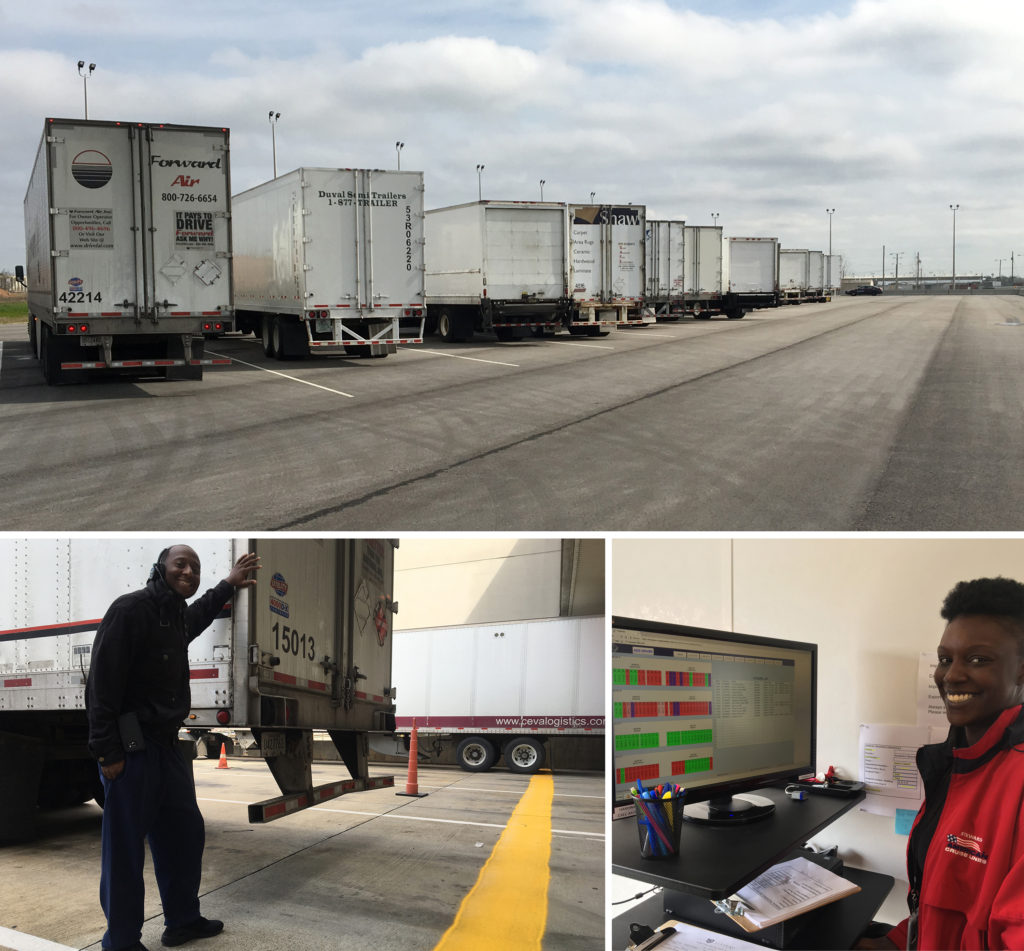
ATL launches TruckPass to improve customer service, grow air cargo

Clockwise from top, trucks line up in the TruckPass lot as drivers wait for their dock assignment. A worker uses sophisticated software in the TruckPass Check-In Station. The freshly painted yellow lines show drivers where to pull up at the dock.
By Shane Blatt
Senior Public Relations Manager
With more than 275,000 passengers and nearly 2,500 takeoffs and landings each day, Hartsfield-Jackson Atlanta International Airport (ATL) is the world’s busiest and most efficient airport.
ATL’s model of efficiency – whether in the skies, on the ramps or in the terminals – involves a complex network of operations designed to move passengers and planes safely and systematically to destinations all over the globe.
Now ATL is bringing the same operating sensibilities to its cargo facilities, namely the South Cargo area. In what’s being hailed as a revolutionary process to reduce roadway congestion and eliminate driver confusion, Hartsfield-Jackson on March 1 launched TruckPass, a reservation-based docking credential system.
“Simply put, it’s dock traffic control,” said Doug Strachan, the Airport’s innovation and strategic business development manager. “We’re taking what, in some cases, is a four-hour ordeal and turning it into a half-hour operation.”
The goal, of course, is expedited loading and unloading of cargo. But with that comes improved customer service. And improved customer service could help ATL recapture lost business and attract new business, thereby achieving the Airport’s ultimate objective: growing air cargo.
Air cargo is a fertile source of employment and economic opportunity in metro Atlanta. In fact, air cargo creates more than 27,000 jobs in Georgia. It transports high-value, time-sensitive items from cut flowers and fresh food to medical equipment and pharmaceutical products.
In 2016, ATL moved 648,595 metric tons of cargo, a 3.58 percent increase over 2015’s total. Although rankings for 2016 have yet to be released, Hartsfield-Jackson in 2015 was No. 12 in the nation among U.S. airports for cargo volume. To land a spot in the top 5, a key milestone set by Atlanta Mayor Kasim Reed, the Airport will need to triple its cargo volume to about 1.8 million metric tons a year.
Indeed, ATL is committed to that goal. The Airport – through its 20-year, $6 billion capital improvement program ATLNext – will add up to 1 million square feet of warehouse space, creating the capacity to accommodate future growth. And with TruckPass, ATL adds another unique value proposition.
“From my perspective, ATL is an important component in the global supply chain,” said Elliott Paige, the Airport’s director of air service development. “With that being the case, we have to make ourselves superefficient. To remain globally competitive, we have to give ourselves an edge. Trucks need to get in and out without delay.”
ATL’s South Cargo area sees more than 350 trucks during high-demand periods per day. On peak days such as Wednesdays and Sundays, traffic can be immobilized.
“The trucks are parked double-, triple- and quadruple-deep,” Strachan said. “So we went to the customer and asked, ‘How do we help you grow your business?’”
Enter TruckPass.
In the same way airlines depend on air traffic control towers to safely maneuver aircraft in controlled airspace and airports depend on ramp control towers to maneuver aircrafts on taxiways, TruckPass will help maneuver trucks in the South Cargo facility.
The system involves three simple steps. First, the truck pulls into the TruckPass lot at 1586 Sullivan Road in College Park. At the TruckPass Check-In Station, the driver provides the following: a cellphone number, name of airline, import or export and a reservation number (if applicable). The driver then either goes straight to his assigned dock or waits for a text message while parked in the TruckPass lot, a temporary holding area with controlled entry and exit.
At the dock, the clock starts.
“Besides creating order out of chaos, we will get all kinds of metrics on dock utilization,” said Strachan, noting that less time spent at each dock means more dock throughput.
“In essence, we’re wringing every last drop of efficiency out of these buildings,” he said.
The precision-driven process will save fuel and time while increasing operational efficiencies. Those efficiencies, coupled with positive word-of-mouth, could pave the way for 15 percent growth in air cargo, Strachan said.
“The air cargo community looks forward to this opening of the TruckPass lot and the efficiency gains it will create,” said Hope Chavez, president of the Atlanta Air Cargo Association.
For Paige, TruckPass is only the beginning of a multipronged approach to growing air cargo.
In addition to increased capacity as a result of ATLNext, Paige said Hartsfield-Jackson is working on a strategy to improve the standard of service with ground handlers – all part of an effort to make the Airport more customer-centric.
“We often like to say change is in the air at Hartsfield-Jackson,” Paige said. “But sometimes, change on the ground is just as important.”








